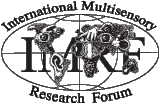Effect of denotative congruency on pleasant impressions for audio-visual stimuli
Last modified: 2011-09-07
Abstract
We examined how the denotative congruency (Masakura & Ichikawa, 2003) in audio-visual stimuli affects the pleasant and restful impressions for the stimuli. In Experiment 1, a single sound was combined with a single motion picture. Results showed that the pleasant and restful impressions for the combined audio-visual stimuli determined by averaging the impressions obtained from each of audio and visual stimuli. In Experiment 2, two sounds were combined with a single motion picture. Results showed that the pleasant and restful impressions positively shifted when one of the sounds was combined with a denotatively congruent motion picture, even if the unpleasant and unrestful sound was combined with unpleasant and unrestful motion picture. These results suggested that the denotative congruency between the audio and visual stimuli would exaggerate pleasant and restful impressions. Reduction of stimulus complexity is expected to lead to exaggeration of pleasant impression (Berlyne, 1970). We are proposing that the reduction of the stimulus complexity underlie the exaggerating effect of denotative congruency on the pleasant and restful impressions in observing the audio-visual stimuli.
References
Masakura, Y., & Ichikawa, M. (2003) How does the interaction between vision and audition improve the effects on deciding impression of environment? VISION, 15, 117-132 (in Japanese with English abstract). Berlyn, D. E. (1970) Novelty, complexity, and hedonic value. Perception & Psychophysics, 8, 279-286.


